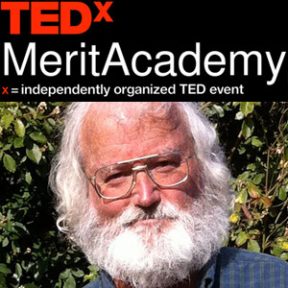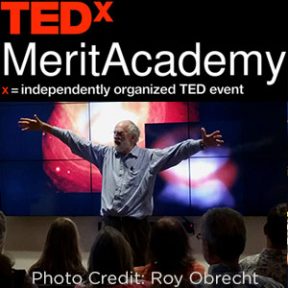 Thrilled that we are hosting a TEDx event at the Rio Theatre in Santa Cruz! Join us on Aug 14, 2017 at 7 pm. Get your tickets for TEDxMeritAcademy at wwwtedxmeritacademy.com. Meet Joe Jordan, one of our speakers!
Thrilled that we are hosting a TEDx event at the Rio Theatre in Santa Cruz! Join us on Aug 14, 2017 at 7 pm. Get your tickets for TEDxMeritAcademy at wwwtedxmeritacademy.com. Meet Joe Jordan, one of our speakers!
“The Sky’s the Limit: Pathways to SOLUTIONS”
The gigantic numbers making up humanity, face huge problems like never before. Solving our way out of this mess will require revolutions in both technical prowess and in morality, fairness and compassion with which we treat one another. It is time for the “sleeping giant” of the MANY, to wake up, take heart, and lead. Here we highlight promising actions that we all can DO to save some semblance of a caring civilization and a hospitable natural environment. “Magic communications”, re-inventing the media from the ground up, can enhance awareness & intelligence as our species grows some wisdom.
About Joe Jordan:
Joe Jordan did atmospheric and space research at NASA/Ames and the SETI Institute (Mountain View) for decades, studying the two largely unrelated problems of stratospheric ozone depletion and tropospheric climate change. Since then he’s been working on solutions, involving education and training (for a new “green workforce”, etc.), and media outreach. He has long been on the Board of Directors of Ecology Action of Santa Cruz, and was the key driver steering that organization toward its present multi-million-dollar enterprise of promoting and implementing energy and water efficiency throughout California. He initiated the large installations of solar-electric (“PV”) systems on several of the Santa Cruz City Schools, as well as the very first PV systems ever to be located on public buildings in that town. Joe is currently co-hosting a new radio-show/podcast-series/social-media-enterprise called “Planet Watch” on KSCO.

 Thrilled that we are hosting a TEDx event at the Rio Theatre in Santa Cruz! Join us on Aug 14, 2017 at 7 pm. Get your tickets for TEDxMeritAcademy at wwwtedxmeritacademy.com. Meet Joe Jordan, one of our speakers!
Thrilled that we are hosting a TEDx event at the Rio Theatre in Santa Cruz! Join us on Aug 14, 2017 at 7 pm. Get your tickets for TEDxMeritAcademy at wwwtedxmeritacademy.com. Meet Joe Jordan, one of our speakers!
“The Sky’s the Limit: Pathways to SOLUTIONS”
The gigantic numbers making up humanity, face huge problems like never before. Solving our way out of this mess will require revolutions in both technical prowess and in morality, fairness and compassion with which we treat one another. It is time for the “sleeping giant” of the MANY, to wake up, take heart, and lead. Here we highlight promising actions that we all can DO to save some semblance of a caring civilization and a hospitable natural environment. “Magic communications”, re-inventing the media from the ground up, can enhance awareness & intelligence as our species grows some wisdom.
About Joe Jordan:
Joe Jordan did atmospheric and space research at NASA/Ames and the SETI Institute (Mountain View) for decades, studying the two largely unrelated problems of stratospheric ozone depletion and tropospheric climate change. Since then he’s been working on solutions, involving education and training (for a new “green workforce”, etc.), and media outreach. He has long been on the Board of Directors of Ecology Action of Santa Cruz, and was the key driver steering that organization toward its present multi-million-dollar enterprise of promoting and implementing energy and water efficiency throughout California. He initiated the large installations of solar-electric (“PV”) systems on several of the Santa Cruz City Schools, as well as the very first PV systems ever to be located on public buildings in that town. Joe is currently co-hosting a new radio-show/podcast-series/social-media-enterprise called “Planet Watch” on KSCO.

 Thrilled that we are hosting a TEDx event at the Rio Theatre in Santa Cruz! Join us on Aug 14, 2017 at 7 pm. Get your tickets for TEDxMeritAcademy at wwwtedxmeritacademy.com. Meet Martin Gaskell, one of our speakers!
Thrilled that we are hosting a TEDx event at the Rio Theatre in Santa Cruz! Join us on Aug 14, 2017 at 7 pm. Get your tickets for TEDxMeritAcademy at wwwtedxmeritacademy.com. Meet Martin Gaskell, one of our speakers!
“Supermassive black holes: the most powerful objects in the universe”
Have you ever wondered whether black holes exist? And if so, how do astronomers study them? What would it be like to be close to a black hole? UCSC astrophysicist Dr. Martin Gaskell has spent his career studying what happens around supermassive black holes in the centers of distant galaxies. He explains in simple, everyday language recent progress in understanding what is going on around these extraordinary objects as they eat up matter around them.
About Martin Gaskell:
Martin Gaskell is a researcher in the Department of Astronomy and Astrophysics at UCSC. He has over four decades of experience working on issues related to supermassive black holes (including a Ph.D.), a couple of hundred publications, and many research grants. He was a finalist for five years in a row for top teaching award at the University of Nebraska. Martin also engages in many popular talks to the public.
 Thrilled that we are hosting a TEDx event at the Rio Theatre in Santa Cruz! Join us on Aug 14, 2017 at 7 pm. Get your tickets for TEDxMeritAcademy at wwwtedxmeritacademy.com. Meet Gregory Gavin, one of our speakers!
Thrilled that we are hosting a TEDx event at the Rio Theatre in Santa Cruz! Join us on Aug 14, 2017 at 7 pm. Get your tickets for TEDxMeritAcademy at wwwtedxmeritacademy.com. Meet Gregory Gavin, one of our speakers!
“What if you built a river in a classroom?”
Artist Gregory Gavin set out to use the engaging properties of water to invigorate public life and ended up creating a new kind of classroom. Only in a world with consequences, he argues, can children truly be engaged, take on responsibility and become creative agents.
About Gregory Gavin:
Gregory Gavin is an artist, inventor and educator. He founded Riveropolis in 2004 to design, build, install and facilitate innovative water play environments and to bring design experiences to schools, museums and neighborhoods. Since 1991, his projects — ranging from woodworking to filmmaking, to interactive waterworks — have engaged a diversity of participants to both create and exhibit work in public places. His work has been particularly successful in overcoming the obsessive segregation of children, teen and adult activities into separate realms in a way that he feels damages the transfer of inter-generational knowledge and discovery. Gavin has been commissioned by National Endowment for the Arts, the de Young Museum, Yerba Buena Center for the Arts, the Seattle Public Art Program and the Bay Area Discovery Museum. He has taught at the California College of the Arts and is a California Arts Council Fellow.
 Thrilled that we are hosting a TEDx event at the Rio Theatre in Santa Cruz! Join us on Aug 14, 2017 at 7 pm. Get your tickets for TEDxMeritAcademy at wwwtedxmeritacademy.com. Meet Hannah Faris, one of our speakers!
Thrilled that we are hosting a TEDx event at the Rio Theatre in Santa Cruz! Join us on Aug 14, 2017 at 7 pm. Get your tickets for TEDxMeritAcademy at wwwtedxmeritacademy.com. Meet Hannah Faris, one of our speakers!
“Creating a grassroots movement to inspire change”
Hannah will be presenting with David Vasquez an exciting advance in environmentally protective technology that can help alleviate and reverse the effects of global warming. She will be focusing on the grassroots movement that will help launch the technology in communities throughout the United States by developing Kids4Hydrogen chapters in each state.
About Hannah Faris:
Hannah Faris is a young environmentalist who became president of Kids 4 Hydrogen when she was a junior in high school. She created the white board video that describes how converting internal combustion engines to use a liquid hydrogen fuel can stop climate change.
 Join us for TEDx MeritAcademy at the Rio Theater in Santa Cruz on Aug 14, 2017 at 7 pm! Get your tickets for TEDxMeritAcademy at tedxmeritacademy.com. Meet Logan Conover, one of our speakers!
Join us for TEDx MeritAcademy at the Rio Theater in Santa Cruz on Aug 14, 2017 at 7 pm! Get your tickets for TEDxMeritAcademy at tedxmeritacademy.com. Meet Logan Conover, one of our speakers!
“Can Individual People Reduce CO2 Enough to Ward Off Climate Change?”
When natural disasters start to happen is the real question behind climate change, not if they will happen. People have already started to see the consequences of rising CO2 levels, with the 2-degree temperature rise and global CO2 levels passing 404 parts per million (ppm). Let’s discuss an easy and practical solution that we can all embrace.
About Logan Conover:
Logan Conover founded When, Not If…, a non-profit organization that educates people about their carbon emissions, the positive feedback loop, and easy solutions to reducing CO2 in the atmosphere. He stumbled across climate change when he learned that many congressmen/women were denying its existence. This frustrated Logan because he couldn’t understand why people wouldn’t believe 99% of the scientists who state that climate change is real with proof that it is real. Logan realized that he needed to something fast and he needed to make it easy, so he created When, Not If… to share facts with people and get the world to take action against climate change.
 Thrilled that we are hosting a TEDx event at the Rio Theatre in Santa Cruz! Join us on Aug 14, 2017 at 7 pm. Get your tickets for TEDxMeritAcademy at tedxmeritacademy.com. Meet Mas Hashimoto, one of our speakers!
Thrilled that we are hosting a TEDx event at the Rio Theatre in Santa Cruz! Join us on Aug 14, 2017 at 7 pm. Get your tickets for TEDxMeritAcademy at tedxmeritacademy.com. Meet Mas Hashimoto, one of our speakers!
Mas Hashimoto
“Japanese Incarceration vs Muslim Racism”
Remember when the American government unjustly incarcerated 120,000 persons of Japanese ancestry, most of whom were American citizens, during WWII? Mas Hashimoto will compare how Japanese American incarceration during WWII and the massive discrimination of Muslims post 9-11 are both founded in hate and racism. Learn how “Make America Great Again” really translates to “Make America White Again.” Learn about what you can do to stop this form of racism and take active steps to protect everyone’s civil and human rights.
About Mas Hashimoto:
Mas Hashimoto was a child when his family was taken from their Watsonville home in 1942. He was sent to a federal prisoner of war camp during WWII because of racism, war hysteria, and political leadership failure. Mas taught US History in the Pajaro Valley Unified School District until his retirement. He speaks to groups of students about the wartime experience of Japanese Americans during WWII to ensure that this injustice never repeats itself again. Mas also headed the re-enactment of the incarceration of Japanese Americans during WWII: “Liberty Lost; Lessons in Loyalty” in 2002, and serves on the Board of Directors of the Watsonville-Santa Cruz chapter Japanese American Citizens League.

Thrilled that we are hosting a TEDx event at the Rio Theatre in Santa Cruz! Join us on Aug 14, 2017 at 7 pm. Get your tickets for TEDxMeritAcademy at wwwtedxmeritacademy.com. Meet Allen Green, one of our speakers!
Allen Green
“Re-Dreaming Democracy – From Plato’s Cave to Folktopia”
Allen invites us to imagine a city of possibilities, called Folktopia – since this vision of brighter futures flows from the minds of folks from all walks of life…including children and elders (rather than a singular author or lone genius). In this imaginary city, we all are called to act as visionaries to champion common causes that elevate us all. In this democratic construction, we radically restructure our social institutions – from schools, to jails, from churches to congress, using new memes to form our next norms. The dynamism of our imaginary city is driven by an economy
of synergy that springs organically from ethical imagination applied to everyday environments. You’ll see!
About Allen Green:
Allen Green is a futurist, facilitator and educator whose work taps the power of social imagination to advance green planning with interactive design. By combining group facilitation with multimedia communication, Allen helps draw vision into action for common causes that unite diverse interests.
With advanced degrees in several fields, Allen has taught collaborative community planning, visionary multicultural leadership, advanced communication and landscape architecture at U.C. Davis, Cal Poly San Luis Obispo, U.C. Berkeley Extension, and San Jose State University. In addition, his energetic seminars are known for inspiring involvement in civic life by people of all ages.
His grant funded collaborations span from a music video on the San Andreas Fault to urban greening projects ranging from digital simulations to hands on site works in community gardens, ecosystem restorations, educational environments and business renovations.
Allen has helped plan, design and organize pioneering partnerships with local leaders, service groups, public agencies, urban youth, volunteers, consultants, contractors, educators, elders and artists in every phase of project development – from fundraising to groundbreaking.
 Living up in the Soquel Hills, we have wild blackberries everywhere. The only problem with wild blackberries is that it’s almost impossible to get to the blackberries because of their thorns. A few years ago, I put in stakes and tied ropes between them to give the blackberries something to hang on.
Living up in the Soquel Hills, we have wild blackberries everywhere. The only problem with wild blackberries is that it’s almost impossible to get to the blackberries because of their thorns. A few years ago, I put in stakes and tied ropes between them to give the blackberries something to hang on.
This year, I wrapped each branch around the ropes and trimmed them back so the stronger, fruit-bearing vines would grow. Last week I picked our first batch of wild blackberries, and it was easy to pick. I love blackberries in my granola and on my desserts! It’s so rewarding to harvest your own fruit.

 Students applying to colleges know that they have to answer lots of questions on applications so the colleges can size you up to see if you fit the profile they’re looking for in their incoming class of freshmen or transfer students. Questions focus on academic records, parent education and employment, school and extracurricular activities, and legacies. At the end of most college applications, students are required to check 2 boxes that inquire about suspensions/expulsions and criminal records. If they check either of the boxes, students are required to write a short essay explaining the circumstances. Louisiana recently barred public colleges from asking about and making admissions decisions based on a student’s criminal past.
Students applying to colleges know that they have to answer lots of questions on applications so the colleges can size you up to see if you fit the profile they’re looking for in their incoming class of freshmen or transfer students. Questions focus on academic records, parent education and employment, school and extracurricular activities, and legacies. At the end of most college applications, students are required to check 2 boxes that inquire about suspensions/expulsions and criminal records. If they check either of the boxes, students are required to write a short essay explaining the circumstances. Louisiana recently barred public colleges from asking about and making admissions decisions based on a student’s criminal past.
There is a growing movement supporting this ban because many students who have criminal records are not dangerous to others (petty theft) and were minors at the time of the incident. By making it difficult for these students to become productive members of society with a college degree, we may be forcing these young people into criminal activity as adults.
Students who check the box about a criminal past are often discriminated in the competitive application process. As a result, many students simply don’t apply to colleges and leave higher education out of their reach for future careers.
On the flipside, should colleges have the right to know about a prospective student’s criminal history? Let’s say the student was involved in violent behavior – or convicted of rape or other heinous activities. Withholding a student’s record of violence, drug abuse, or other activities might prove to be a mistake when colleges build incoming classes.
This is a sensitive issue. One on hand, teens make mistakes and should be given the opportunity to right their wrongs. On the other hand, colleges have the right to know about their students’ past activities (academic, extracurricular, and criminal) so they can make appropriate decisions.
Public colleges already give students the opportunity to explain the criminal record, but it appears that college admissions officers aren’t sympathetic to these types of lessons learned. One of my female clients was sexually assaulted by a teen boy. She punched him when he harassed her in school, and then she tried to scare him with her car as she drove past him in the school parking lot. She was suspended but the boy walked away with no record. Granted, this was not acceptable behavior but she was denied admission from several public colleges.
What are your thoughts about “banning the box”?
[Source]
 Five years after we planted 17 new fruit trees, we finally got a bumper crop of peaches. We harvested our first batch recently. There’s nothing as wonderful as biting into a perfectly ripened peach that you just picked off your tree! They’re beautiful, juicy, and sweet!
Five years after we planted 17 new fruit trees, we finally got a bumper crop of peaches. We harvested our first batch recently. There’s nothing as wonderful as biting into a perfectly ripened peach that you just picked off your tree! They’re beautiful, juicy, and sweet!
100% organic with no pesticides! Surprisingly, the bugs and birds didn’t get to them before we did this year.
Come on over for some fresh peaches and peach pies!











